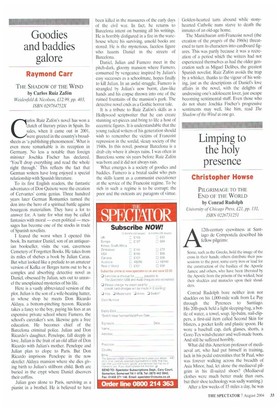Goodies and baddies galore
Raymond Carr
THE SHADOW OF THE WIND by Carlos Ruiz Zafon Weidenfeld & Nicolson, £12.99, pp. 403, ISBN 029784752X Carlos Ruiz Zafon's novel has won a clutch of literary prizes in Spain. Its sales, when it came out in 2001, were greeted in the country's broadsheets as 'a publishing phenomenon'. What is even more remarkable is its reception in Germany. No less a notable than foreign minister Joschka Fischer has declared, 'You'll drop everything and read the whole right through.' This reflects the fact that German writers have long enjoyed a special relationship with Spanish literature.
To its first English readers, the fantastic adventures of Don Quixote were the creation of Cervantes' comic genius. Three hundred years later German Romantics turned the don into the hero of a spiritual battle against bourgeois materialism. They have a lot to answer for. A taste for what may be called fantasies with moral — even political — messages has become one of the stocks in trade of Spanish novelists.
I feared the worst when I opened this book. Its narrator Daniel, son of an antiquarian bookseller, visits the vast, cavernous Cemetery of Forgotten Books. He takes from its miles of shelves a book by Julian Carax. But what looked like a prelude to an amateur version of Kaika or Borges turns out to be a complex and absorbing detective novel as Daniel, obsessed by Julian, sets out to unravel the unexplained mysteries of his life.
Here is a vastly abbreviated version of the plot. Julian is the son of a wife-beating hatter, in whose shop he meets Don Ricardo Aldaya, a bottom-pinching tycoon. Ricardo takes a fancy to the boy, paying his fees at an expensive private school where Fumero, the school's caretaker's son, likewise gets a free education. He becomes chief of the Barcelona criminal police. Julian and Don Ricardo's daughter, Penelope, fall deeply in love. Julian is the fruit of an old affair of Don Ricardo with Julian's mother. Penelope and Julian plan to elope to Paris. But Don Ricardo imprisons Penelope in the now derelict Aldaya mansion where she dies giving birth to Julian's stillborn child. Both are buried in the crypt where Daniel discovers their coffins.
Julian goes alone to Paris, surviving as a pianist in a brothel. He is believed to have been killed in the massacres of the early days of the civil war. In fact, he returns to Barcelona intent on burning all his writings. He is horribly disfigured in a fire in the warehouse where his surviving, unsold books are stored. He is the mysterious, faceless figure who haunts Daniel in the streets of Barcelona.
Daniel, Julian and Fumero meet in the pitch-dark, gloomy mansion where Fumero. consumed by vengeance inspired by Julian's easy successes as a schoolmate, hopes finally to kill Julian. In an awful struggle. Fumero is strangled by Julian's now burnt, claw-like hands and his corpse thrown into one of the ruined fountains of the mansion's park. The detective novel ends as a Gothic horror tale.
It is a tribute to Ruiz Zafon's skills as a Hollywood scriptwriter that he can create stunning set-pieces and bring to life a host of eccentric figures. It is understandable that the young radical writers of his generation should wish to remember the victims of Francoist repression in the sordid, sleazy society of the 1940s. In this novel, postwar Barcelona is a drab city where it always rains. I was often in Barcelona some six years before Ruiz Z,afOn was born and it did not always rain.
What emerges is a society of goodies and baddies. Fumero is a brutal sadist who puts the skills learnt as a communist executioner at the service of the Francoist regime. To be rich in such a regime is to be corrupt; the poor and the outcasts are paragons of virtue. Golden-hearted tarts abound while stonyhearted Catholic nuns starve to death the inmates of an old-age home.
The Manichaean anti-Francoist novel (the creation of the progres of the 1960s) threatened to turn its characters into cardboard figures. This was partly because it was a recreation of a period which the writers had not experienced themselves as had the older generation such as Miguel Delibes, the greatest Spanish novelist. Ruiz Zafon avoids the trap by a whisker, thanks to the vigour of his writing, just as the descriptions of Daniel's love affairs in the novel, with the delights of undressing one's adolescent lover, just escape becoming sentimental stuff. Even those who do not share Joschka Fischer's progressive sentiments may well, like him, read The Shadow of the Wind at one go.


























































 Previous page
Previous page